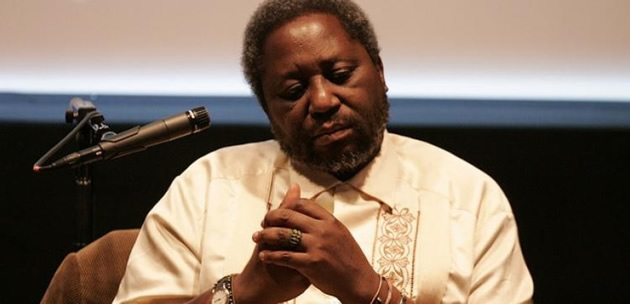Chenjerai Hove, this is an anticlimax my brother

Ignatius Mabasa Shelling The Nuts
THIS is an anticlimax of monumental proportions Chenjerai Hove, mukoma wangu! Kings also sleep, but they must sleep with dignity. I got the news of your death on Sunday July 12 in the evening from Memory Chirere who had heard about it from your buddy Chirikure Chirikure. The message just
said, “Chenjerai passed away this afternoon in Norway. Liver failure.” Ironically, my last meeting with you was in Oslo, Norway where you were giving a talk. You took me aside and confided that you had butterflies in your stomach.
You still had half an hour before your presentation, and you asked me if there were any pubs in the vicinity where you could quickly get a few glasses of wine.
When we got to a nearby pub, you ordered and very quickly downed three glasses of red wine. After that, you said you were much better prepared to talk and confound your audience.
Baba vaTambu, I know you used to jokingly say “Mupfanha, Baba vaTambu izita rekuhondo!” But now in hindsight, I think you were fighting too many wars — real and imaginary. Your death is very sad news, not because you were not supposed to die, but because of how and where you died.
You left home swiftly like an arrow — kuita zvekudauka kunge museve waenda neuma. When you left home and your house, wife and children — I never thought or dreamed you would die out there in the cold, strange foreign lands that don’t speak your language, understand, know your totem or know the road to Mazvihwa.
Did you dream of home after all those years? The red hills of home? Baba vaTambu, your books will become our heritage, but you should not have died lonely. Look, you are now going to come back home silent as if you did not have words to speak. Indeed the mouth is a cave in which words can hide. But I dare you to speak. What were you running away from? Chinua Achebe said, “A toad does not jump in broad daylight for nothing, something will be after its life.” Who was after your life? Why did you protect your persecutors by not naming them if they were real?
Dying without telling your story makes me angry. If indeed you were in trouble — handiti mhosva inoripwa here? Nyangwe vakauraya munhu chaivo vanoripa ngozi wani? Yako ingozi rudzii mukoma?
Your death is some kind of teasing and contemptuous action. You are now coming home because you know that “nobody can do nothing” to you. Like Muhammad Ali said when he fought George Foreman in 1975 in Zaire, “George Foreman hits hard, but hitting power don’t mean nothing if you can find nothing to hit.” Chenjerai, you are now coming back home as bones and shadows. Nhai imi wee-e mazvihwa here imi veMazvihwa kuti gomo riye rawondomoka? Kuti ngondongondo!
Chenjerai, you are not the one to have died the death of a vagabond.
You died poor when you were the son of a king back home. I could feel your poverty when you tried to write me those few e-mails. You were lonely and sad, you longed for company, but our friendship had become mechanical — so unlike those days when you would play the music of Sankomota over and over again. You had become evasive baba vaTambu. You had changed so much and the poverty of being unwanted, unloved and uncared for was eating your laughter and joy. You know how much I wanted you to come back home, but you never wanted to hear about that subject.
Talk about coming back home made you very angry and act strange. Maybe that is why when you last tried to revive our friendship through Facebook, you sounded negative, dark, disturbed and angry. Unfortunately, my conversations with you squeaked and betrayed the absence of a lubricant called relaxed friendship and familiarity.
Did Oslo really know who you were, or they just saw in you as another brick in the wall? When you walked down Carl Johan Street or waited for the snow delayed train, I am sure they saw just another poor African trying to earn a degree or seeking greener pastures, an economic refugee.
I was hoping that one day you would come back home to walk on the home soil that moulded and gave your writing texture, colour and music. In contrast to Oslo, your people would have smiled and waved at you, fondly talked to you and even bought you a drink.
But you never came back home. Instead, they are now going to bring you back home. Chenjerai, you were not the type to die in exile, to be brought back home.
What a waste, such a waste!
We wanted you to come back home, to hug you and listen to you reading and occasionally feeding your nose with that brown powder you were fond of! Chenjerai, it was you who taught us to read and give life to words until they walked. You were naughty, and Chiedza Msengezi thought you were too syrupy. That was true, you were excessively sentimental, too smooth and slippery both with your eyes and your mouth.
You thought Memory Chirere was too slow and blind to Zvisinei Sandi’s flirts and skirts. You wanted us to write about love and not politics. You said politics made you tired.
Nhamo Mhiripiri called me at 2am yesterday to check if the news was true. He fondly spoke about the time you guided our group of budding writers at the University of Zimbabwe.
I am grateful for the great opportunity you gave me to learn from you and to be your acquaintance.
It is not just me, but a lot of other people who benefited from your mentorship when you worked as the last writer in residence at the University of Zimbabwe. We had the wonderful privilege of listening to you reading extracts from the book you were writing at that time — Ancestors. I know that Nhamo Mhiripiri, Joyce Mutiti, Thabisani Ndlovu, Chiedza Msengezi, Ruzvidzo Mupfudza (the late), Memory Chirere, Emmanuel Sigauke, Thabisani Ndlovu, Eresina Hwede and others who were in your creative writing group will agree that you were a damn talented wordsmith.
So after all that labouring for your country — this is how you decide to die? I know death will one day come and drag us all to his place, but unongodawo kufa zvine kadignity. Kumusha kunongoramba kuri kumusha, nyangwe kukasevewa sadza nedoro. Kudzoka mave chitunha here baba vaTambu? Ko mukadzi nevana vanoti kudii nazvo? Mukoma you have been a big let down to your family, your friends and country. We needed you here, to confront your shadows, to bury your bones. I am sorry mukoma wangu, I am unable to hide my disappointment.
Tell me that you left the country not because you were a coward. But your pen was never a coward. I never thought you would die so far away from home, so far away from your people, from Mazvihwa.
Baba vaTambu — you have been a big disappointment and let down. I am angry that I am unable to wake you up. Chirara zvako uzorore pane zvakanga zvichikumhanyisa mukoma. I know that like Shrek said in one of the Shrek movies, “Even ogres sometimes do get scarred.”
Nesuwo hatingazive chinotyisa zvakadaro zvekutyisidzira munyori zvekuti anobva atadza kana kutaura.
You were a writer and a prophet. You wrote in the prologue of your novel Ancestors that, “Feet walk, reminding the bare soles that the destination is far-off, an unknown place at which the winds and the earth meet. Human breath tires with its history of blood and flesh. The epitaph on the grave of the traveller reads: Here lies a traveller who did not arrive, like all of us.” Indeed, you got tired and did not arrive Chenjerai. We were waiting for you for many years. Even your bar stool at Queensdale Sports Club was waiting for you until it retired. Who were you writing for?
Whose story is this, the story of ancestors? You warned yourself of the implications of moving away from home.










Comments